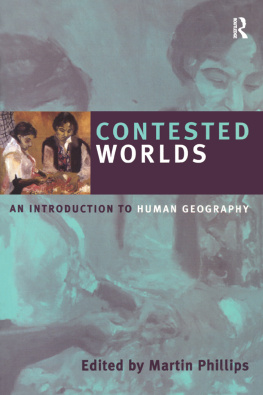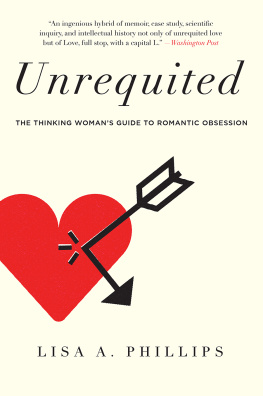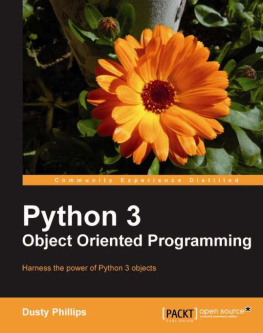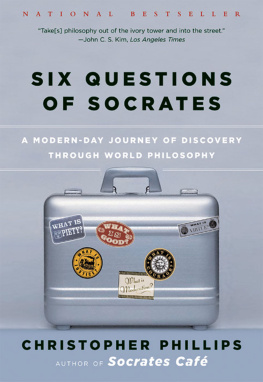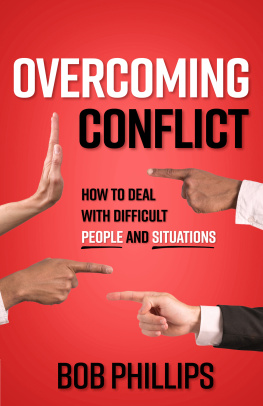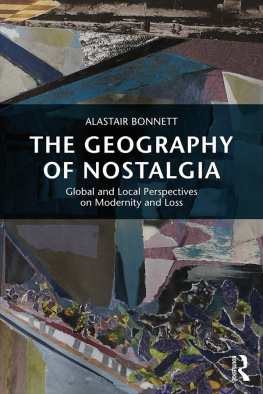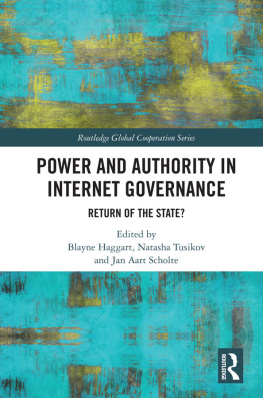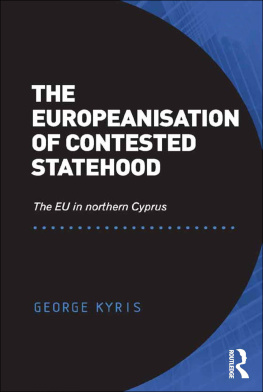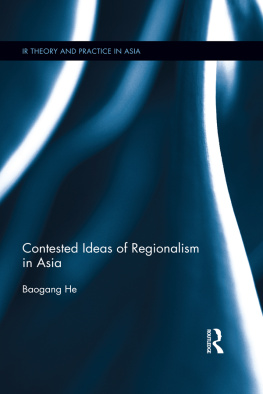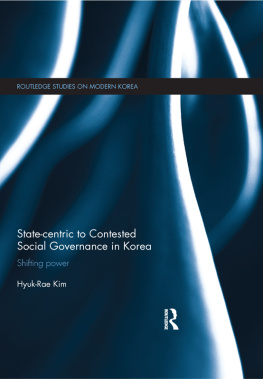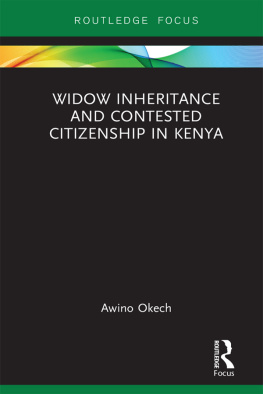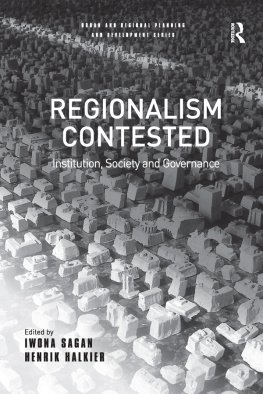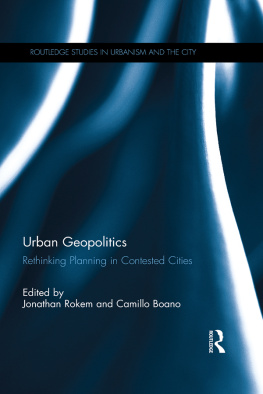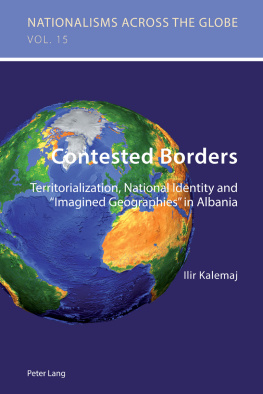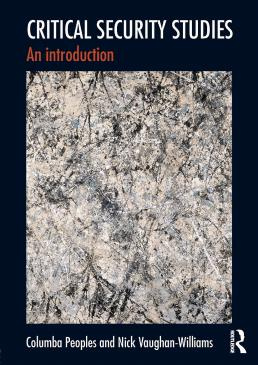Contents

CONTESTED WORLDS
Contested Worlds
An Introduction to Human Geography
Edited by
MARTIN PHILLIPS
Senior Lecturer in Geography, University of Leicester

First published 2005 by Ashgate Publishing
Published 2017 by Routledge
2 Park Square, Milton Park, Abingdon, Oxon OX14 4RN
711 Third Avenue, New York, NY 10017, USA
Routledge is an imprint of the Taylor & Francis Group, an informa business
Copyright Martin Phillips 2005
Martin Phillips has asserted his right under the Copyright, Designs and Patents Act, 1988, to be identified as the editor of this work.
All rights reserved. No part of this book may be reprinted or reproduced or utilised in any form or by any electronic, mechanical, or other means, now known or hereafter invented, including photocopying and recording, or in any information storage or retrieval system, without permission in writing from the publishers.
Notice:
Product or corporate names may be trademarks or registered trademarks, and are used only for identification and explanation without intent to infringe.
British Library Cataloguing in Publication Data
Contested worlds : an introduction to human geography
1. Human geography
I. Phillips, Martin, 1961
304.2
Library of Congress Cataloging-in-Publication Data
Contested worlds : an introduction to human geography / edited by Martin Phillips,
p. cm.
Includes bibliographical references and index
ISBN 0-7546-4112-0
1. Human geography. I. Phillips, Martin, 1961
GF41.C576 2005
304.2--dc22
2004056936
ISBN 13: 978-0-7546-7031-5 (pbk)
Typeset by Saxon Graphics Ltd, Derby
Contents
Martin Phillips
Martin Phillips
Ed Brown
Hazel Barrett and Angela Browne
Peter Vujakovic
Keith Hoggart
Mark Cleary
Craig Young
Phil Hubbard
Martin Phillips
David Cook and Martin Phillips
Martin Phillips
Dr. Hazel Barrett | School of Natural and Environmental Sciences, Coventry University, Coventry CV 1 5FB |
Dr. Angela Browne | School of Natural and Environmental Sciences, Coventry University, Coventry CV 1 5FB |
Dr. Ed Brown | Department of Geography, Loughborough University, Loughborough LEI 1 3TU |
Professor Mark Cleary | Department of Geographical Sciences, University of Plymouth |
David Cook | Department of Media Arts, The Waikato Polytechnic, Private Bag 3036, Hamilton 2020, New Zealand |
Professor Keith Hoggart | Department of Geography, Kings College, University of London, London WC2R 2LS |
Dr. Phil Hubbard | Department of Geography, Loughborough University, Loughborough LEI 1 3TU |
Dr. Martin Phillips | Department of Geography, University of Leicester, Leicester LEI 7RH |
Dr. Peter Vujakovic | Department of Geography and Tourism, Canterbury Christchurch University College, Canterbury CT1 1QU |
Dr. Craig Young | Department of Environmental and Geographical Sciences, Manchester Metropolitan University, Manchester, M l 5GD |
Part One:
Introduction
Martin Phillips
Worlds of Contest: An Introduction
This book will explore the contested worlds of contemporary human geography. As has become very evident over the course completing this book, the world is full of contests and contestations, many of which are violent and bloody. When this book was initially commissioned, the thought of two aeroplanes being flown into and demolishing one of the worlds largest buildings and causing the death of some 2,700 people was to most people unimaginable. It was widely argued that the end of the Cold War between East and West would herald the onset of a period of world peace. However, since that time there has been two Gulf Wars (1990, 2003), the second of which was rhetorically linked to a wider War on terrorism and which also involved an invasion of Afghanistan in 2002. There have also been a series of Balkan Wars in the 1990s, plus a host of other civil wars in places such as Eritrea, Haiti, Rwanda, Somalia and Uganda. Rather than being a period of peace, the late twentieth and early twenty-first century might be characterised as a period of widening warfare, terrorism, genocide and torture.
Contests do not necessarily take such violent forms, and many are much more benign. In sport, for example, contests connect with spectacles and rituals, although increasingly sport is connected to other forms of contest, which although in a sense non-violent in that there is no actual or implied use of physical force, could be seen as highly violent in having all manner of dramatic consequences on peoples livelihoods and lifestyles. These other contests are those that revolve around competition between firms for market shares, lower costs and continued profits, and also between politicians for peoples votes and support. There are also contestations between people with different sets of beliefs and attitudes. Although these may at times connect to the previously mentioned forms of contests, and also to ideological debates and conflict, at other times they may simply lead to indifference, inactivity and silence as people fail to recognise the needs, aspirations and indeed presence of people who are in some manner different from themselves. People may inhabit physical locations which are proximate spatially and temporally but they live in quite different circumstances and, for a series of different reasons, in effect inhabit quite different worlds.
The contested nature of the contemporary world, or indeed worlds, has often been filtered out from geographical accounts. Philo (1991) has suggested that much of geography over the last 50 years has been frightened of considering things which maybe have worryingly political overtones, preferring instead to seek out some uncontestable geography (Whittlesey 1945). However, Philo suggests that this restriction, along with a distrust of studying intangible things, has come to be challenged and replaced by less restricted visions of geography. Many of these visions, particularly those linked to notions of radical or critical geography, might be seen to be infused as much by some form of imagination of power (Said 1986) as by any particular geographical imagination.
This neglect of contestation is problematic given that many contests can be seen to be, in one way or another, highly geographical. Acts of warfare, terrorism, genocide and torture, for example, are often connected to territorial conflicts, with people seeking to gain access to particular areas of space and/or expel other people from particular places. Violent conflicts may also relate to access to particular aspects of nature, and hence may be seen as geographical if one ascribes to the notion that geography is about people-nature relations (see Unwin 1992).
The more benign forms of social contest can also be seen as having clear geographical dimensions, not least in that they are often organised using spatial distinctions. Not only do many sports make use of spatial zones or positionings but sports are often organised according to spatial areas of various scales in that there are national, regional and local teams and competitions. Furthermore the spatial scale at which sport is being practised may be shifting, with growth in the number and spatial extent of international competitions: in rugby, for instance, recent years have seen the creation of world, hemispherical and continental competitions. Furthermore, as MacEwan (2001) notes, many national leagues, such as the English soccer Premiership, have become increasingly globalised through the employment of players from other countries. MacEwan adds that localised differences in sport do remain, and it is also evident that shifts towards more globalised forms is often the subject of varied contestations. In Britain, for example, local supporters often complain about the presence of overseas players in their club and about the impacts that competing in overseas competitions has on performances in domestic leagues and tournaments, while concerns have also been expressed about the impacts of these changes on the performances of national teams. The practices of sport may well be becoming more globalised, but for many people national, regional and local identities and performances still matter greatly.

